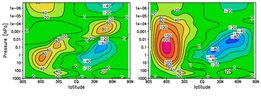Gravity-wave impacts
The impact of subgrid-scale GWs on the resolved atmosphere is the key interest of climate modelers and weather forecasters. Getting these effects right is the basic motivation of our research initiative, and it actually provides the ultimate justification of GW research for the practitioner. Corresponding success, however, also is an interesting challenge for GW science as such. It requires sufficient understanding of GW dynamics. Problems in a correct description of GW impacts are a clear indication that more is to be learnt. Next to this central question, whether parameterizations developed in the RU make a successful simulation of these impacts possible, also comes the consideration how detailed the parameterizations must be to achieve this goal. Most notably: Which part of the GW spectrum is relevant so that it requires faithful treatment? A leading-order GW impact to be addressed is the seasonally dependent wind and temperature climatology, from the ground to the mesosphere/lower thermosphere. Special focus will be given to the mean circulation in the polar summer middle atmosphere because this is the region of a typical systematic easterlies bias, which is possibly directly related to GW treatments, given the negligible role of planetary waves when the mean flow is easterly. The role GWs play in the dynamics of sudden stratospheric warmings, e.g. [RPS08, AGM+10, RSG10] is of interest as well. Other impacts, to be analyzed in the 2nd three-year phase of the research unit are:
- Impact on the semi-annual oscillation (SAO) and on QBO.
- The GW impact on Rossby waves, which can also be investigated in the laboratory.
- The impact on water vapor and clouds in the upper troposphere/lower stratosphere (UTLS).
- The role of GW dynamics in climate change shall be addressed [BSB+06, LAW08, MS09], and how improved GW parameterizations might modify our knowledge in this regard.
Objectives which are addressed, at least partially, in the 1st phase:
►I1: GW impact on the seasonally dependent climatology and on atmospheric variability on the resolved scale (contributing projects: GWING, PACOG, SV, GW-TP, SI, 3DMSD):
- Climatology in general.
- Summer-hemisphere climate in the middle atmosphere.
- GW impact on planetary waves in sudden stratospheric warmings.
►I2: Assessment of the level of complexity of a GW parameterization necessary to capture leading GW impacts (contributing projects: GWING, SV, GW-TP, SI, 3DMSD):
- Impact of improved source parameterizations.
- Impact of different GW scales.
- Impact of an improved description of GW propagation, taking into account (1) horizontal propagation, (2) background transience, (3) an explicit description of GW propagation vs instantaneous adjustment of GW profiles, and (4) explicit modelling of GW-tropopause- interaction processes.
- Impact of improvements in the parameterization of GW dissipation.

